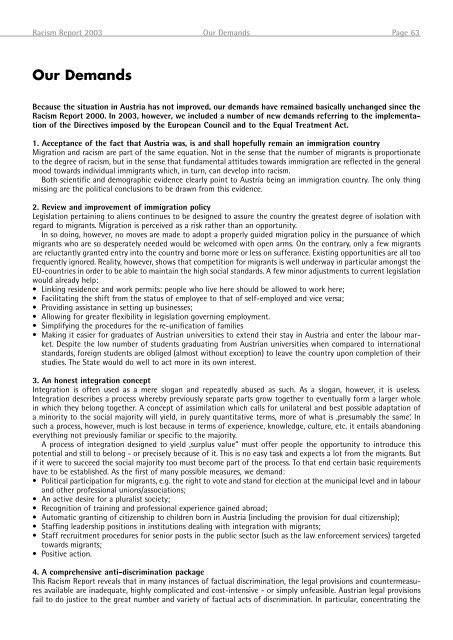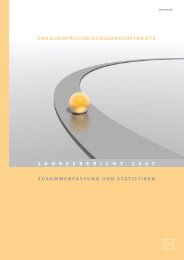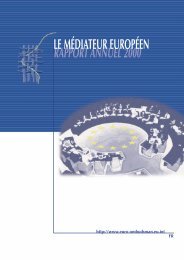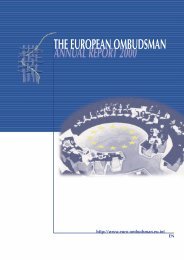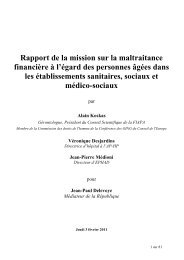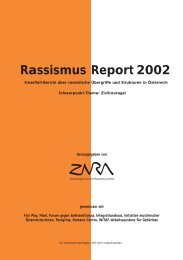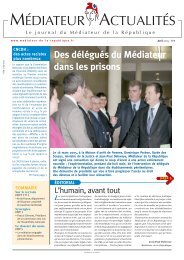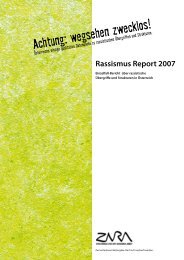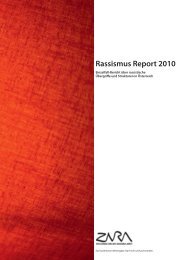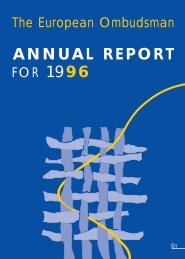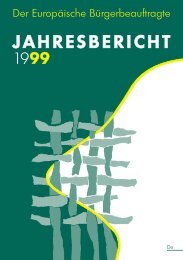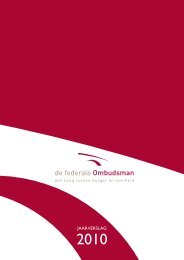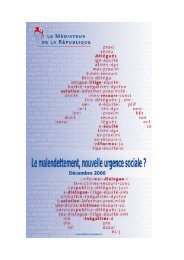Page 62 Focus Issue: <strong>Racism</strong> and the Law <strong>Racism</strong> <strong>Report</strong> <strong>2003</strong>cerned. He/she may request further information from the employer or the organisation, the works council or fellowemployees of the company concerned. They in turn are obliged to give evidence.If the ombudsman/woman has reason to assume a violation of the equal treatment regulation (§ 5 para. 3, GBK/GAW Law) and if he/she credibly presents the circumstances being claimed to the panel, the panel is obliged ex officioto initiate proceedings pursuant to § 11 or § 12 GBK/GAW Law. The panel may entrust the ombudsman/woman withthe investigations.The ombudswoman/man for questions of equal treatment irrespective of race or ethnic origin, religion or belief,age or sexual orientation in other fields is responsible for rendering guidance and assistance to persons consideringthemselves discriminated pursuant to Part II, section 1 GlBG. He/she conducts this activity independently (§ 6 para 1GBK/GAW Law). He/she is entitled to make enquiries. Persons being enquired are obliged to give evidence.The panels of the Equal Treatment Commission are required to deal with all matters within the sphere of theircompetence and touching on discrimination as well as with all infringements of the guidelines set forth in the equaltreatment regulation (§ 8 GBK/GAW Law).Upon petition by one of the interest groups represented on the panel of the Commission or upon request ofthe ombudswoman/man or ex officio, the panel in charge must prepare expertises as to whether the equal treatmentregulation was violated (§ 11 GBK/GAW Law). Upon petition by an employee, an employer, a works council,an interest group represented on the respective panel of the Commission, a victim of discrimination pursuant tothe second part of the Basic Law, upon request by the ombudswoman/man or ex officio the panel must examineindividual cases and determine whether the equal treatment regulation was violated (§ 12 GBK/GAW Law).According to § 12 para. 2 the person concerned (i.e. the victim) is entitled to representation before the Commissionby a person of his/her trust, in particular by a representative of an interest group or a non-governmental organisation(NGO) (the right to file a petition).If a petition/request is not met, any member of the interest group represented on the respectivepanel is empowered to take the matter before the competent labour or civil court for establishmentas to whether the equal treatment regulation was violated (§ 12 para. 4 GBK/GAW Law). In orderto do so, the ombudswoman/man needs the approval of the employee or of the person concerned.(Please note that the above is a translation based on the official and valid German version of the proposal for anEqual Treatment Act.)With the exception of the provisions regulating gender issues the draft does not include any positive action. As itis obvious that in many cases discrimination occurs when in search of employment or housing, it would seem selfevidentthat positive action ought to be taken (such as preferential acceptance, preferential treatment in professionalpromotion or advanced vocational training). In these instances of structural discrimination the „Equal Treatment Act“does not come up with a solution.Both EU Directives provide that organisations and associations with a legitimate interest in contributing to thefight against discrimination may engage on behalf of the complainant and represent him/her in any judicial and/oradministrative procedure. The Directives furthermore provide for an institutionalised dialogue with non governmentalorganisations (NGOs). In its current proposal the Austrian government does not include either provision. Hence,in spite of clear regulations stipulated on the European level, the expertise of Austrian NGOs is neither included noracknowledged nor used.Austrian organisations and associations involved in the fight against the manifold forms of discrimination decidedto combine their respective forces and experiences in a newly found association. The „Klagsverband zur Durchsetzungder Rechte von Diskriminierungsopfern“ (Claimants Association for the Enforcement of the Rights of Victims ofDiscrimination) is an affiliation of specialised institutions with the aim of rendering and guaranteeing the best possibleassistance to victims of discrimination. The objective is to obtain for the NGOs the legally binding right of representationin conformity with the Directives as well as the possibility for an engaging in legal proceedings on behalf ofvictims (in accordance with the empowerment of associations or legal entities to engage in legal proceedings) which,as it is known in the field of consumer protection, represents an effective method for the enforcement of rights.In Austria discrimination continues to be a major problem. Minimal solutions do not make sense. A law which fails toprovide for effective action and/or to publish the ban on discrimination both in the public and private sector (police,media, neighbourhood problems, education and training, etc.) and which fails to provide for general legal protectionfor victims of discrimination only means additional paper but does not deliver an effective tool. Unless a law is passedrecognising the fact that Austria has a discrimination problem (and doesn‘t hide behind the term „equal treatment“)we will yet have to wait for a fair and just society in Austria.The ZARA Team
<strong>Racism</strong> <strong>Report</strong> <strong>2003</strong> Our Demands Page 63Our DemandsBecause the situation in Austria has not improved, our demands have remained basically unchanged since the<strong>Racism</strong> <strong>Report</strong> 2000. In <strong>2003</strong>, however, we included a number of new demands referring to the implementationof the Directives imposed by the European Council and to the Equal Treatment Act.1. Acceptance of the fact that Austria was, is and shall hopefully remain an immigration countryMigration and racism are part of the same equation. Not in the sense that the number of migrants is proportionateto the degree of racism, but in the sense that fundamental attitudes towards immigration are reflected in the generalmood towards individual immigrants which, in turn, can develop into racism.Both scientific and demographic evidence clearly point to Austria being an immigration country. The only thingmissing are the political conclusions to be drawn from this evidence.2. Review and improvement of immigration policyLegislation pertaining to aliens continues to be designed to assure the country the greatest degree of isolation withregard to migrants. Migration is perceived as a risk rather than an opportunity.In so doing, however, no moves are made to adopt a properly guided migration policy in the pursuance of whichmigrants who are so desperately needed would be welcomed with open arms. On the contrary, only a few migrantsare reluctantly granted entry into the country and borne more or less on sufferance. Existing opportunities are all toofrequently ignored. Reality, however, shows that competition for migrants is well underway in particular amongst theEU-countries in order to be able to maintain the high social standards. A few minor adjustments to current legislationwould already help:• Linking residence and work permits: people who live here should be allowed to work here;• Facilitating the shift from the status of employee to that of self-employed and vice versa;• Providing assistance in setting up businesses;• Allowing for greater flexibility in legislation governing employment.• Simplifying the procedures for the re-unification of families• Making it easier for graduates of Austrian universities to extend their stay in Austria and enter the labour market.Despite the low number of students graduating from Austrian universities when compared to internationalstandards, foreign students are obliged (almost without exception) to leave the country upon completion of theirstudies. The State would do well to act more in its own interest.3. An honest integration conceptIntegration is often used as a mere slogan and repeatedly abused as such. As a slogan, however, it is useless.Integration describes a process whereby previously separate parts grow together to eventually form a larger wholein which they belong together. A concept of assimilation which calls for unilateral and best possible adaptation ofa minority to the social majority will yield, in purely quantitative terms, more of what is ‚presumably the same‘. Insuch a process, however, much is lost because in terms of experience, knowledge, culture, etc. it entails abandoningeverything not previously familiar or specific to the majority.A process of integration designed to yield ‚surplus value“ must offer people the opportunity to introduce thispotential and still to belong - or precisely because of it. This is no easy task and expects a lot from the migrants. Butif it were to succeed the social majority too must become part of the process. To that end certain basic requirementshave to be established. As the first of many possible measures, we demand:• Political participation for migrants, e.g. the right to vote and stand for election at the municipal level and in labourand other professional unions/associations;• An active desire for a pluralist society;• Recognition of training and professional experience gained abroad;• Automatic granting of citizenship to children born in Austria (including the provision for dual citizenship);• Staffing leadership positions in institutions dealing with integration with migrants;• Staff recruitment procedures for senior posts in the public sector (such as the law enforcement services) targetedtowards migrants;• Positive action.4. A comprehensive anti-discrimination packageThis <strong>Racism</strong> <strong>Report</strong> reveals that in many instances of factual discrimination, the legal provisions and countermeasuresavailable are inadequate, highly complicated and cost-intensive - or simply unfeasible. Austrian legal provisionsfail to do justice to the great number and variety of factual acts of discrimination. In particular, concentrating the


